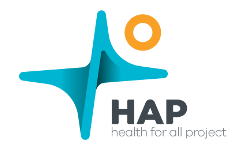
From September to December 2025, HAP is implementing a series of activities aimed at strengthening primary health care, including trainings for doctors and nurses, support for home care monitoring visits, enhancement of the pedagogical component in trainer trainings, and more.
Currently, doctors and nurses from 19 health centres across the country are being trained in the implementation of protocols for non-communicable diseases and mental health, with the goal of improving prevention and management of NCDs at the community level. An important innovation in this regard is HAP’s support for the development of the Psychologist’s Manual in Primary Health Care, which is now being prepared for publication. This manual represents a key step in integrating a biopsychosocial perspective into primary care, combining physical and mental health elements to promote sustainable well-being.
At the same time, the project continues to strongly support the expansion of home care. By the end of the year, nurses from 30 health centres will be taking part in training-of-trainers on standard nursing procedures, which are essential for equipping them to deliver this long-awaited service to all immobilised chronically ill patients who are unable to visit health centres. By December 2025, HAP will have trained nurses from 150 health centres across the country.
To ensure that knowledge is effectively transferred to the rest of the staff through the cascade approach, HAP will also support the pedagogical training of nurse-trainers within the four Regional Health Care Operators. These trainers will play a key role in disseminating the new standards through Peer Groups, ensuring that best practices become part of everyday work.
Quality control remains a crucial element. In this context, HAP will support 35 monitoring visits for home health care by the end of the year, while data from the Health Care Quality Study are currently being processed. This study assesses the impact of the project’s interventions and provides a basis for further improvements.
At the same time, HAP continues to support advocacy activities for the inclusion of home health care costs in the budgets of health centres, in order to ensure the sustainability of this service.
Through these multifaceted interventions, HAP aims to guarantee higher-quality, more inclusive, and more accessible health care that meets the real needs of citizens, while enhancing the professionalism of medical staff and strengthening the role of primary health care in Albania.

